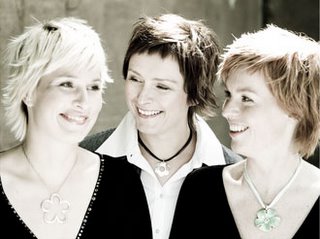
Trio Mediæval (L to R) Anna Maria Friman, Torunn Østrem Ossum, and Linn Andrea Fuglseth |
A stunning 2005 concert by Trio Mediæval made their next appearance in Washington a musical imperative. The chance came on Friday night, when their portion of the program, part of the Kennedy Center's A Cappella festival, featured pieces from their recent recordings of medieval English polyphony and Norwegian folk song. By performing English conductus and clausule, the three Scandinavian singers are trespassing on the territory of Anonymous 4, the group that disbanded just as Trio Mediæval was becoming known. The American quartet's many excellent recordings are beloved occupants of my CD shelves, but at the risk of committing heresy, the sound of Trio Mediæval is even purer and imbued with an even lovelier fragility.
English and the Scandinavian languages are historically related, which made Trio Mediæval's pronunciation of the Old English texts seem natural. Likewise, their Latin diction was so clear that those texts came across clearly enough to be understood, even though none of the words Trio Mediæval sang had made it into the program. In the motet selections, the three voices, who are so perfectly matched, handled the Stimmtausch, or exchange of parts among the voices, as one organic sound. Of exceptional beauty was the conductus Salve virgo virginum, sung at a slower pace than Anonymous 4's recording and exquisitely shaped in ever more and more delicate shapes.
The second half was given over to selections from Trio Mediæval's most recent disc of Norwegian folk song settings. The three women began with a sort of improvised cantillation, reminiscent at times of Meredith Monk, calling to each other from the steep aisles of the Terrace Theater as if from opposite sides of a fjord. The lovely lullaby So ro, godt barn recalled the 13th-century Dou way Robyn, a mother's plaint to her husband not to wake the baby, sung as an ostinato background to a solo invocation of that most maternal of mothers, Mary.
The concert was shared with Cantus, an all-male ensemble founded at St. Olaf College in Minnesota. Their program opened auspiciously, with the near juxtaposition of Eric Whitacre's Lux aurumque and the opening piece of Tallis's delectable setting of the Lamentations. Both pieces made for worthy listening, clearly tuned and with careful calibration of dissonance and resolution. Overall, to place them in terms of their competition, Cantus is generally more consistent in sound than the Suspicious Cheese Lords but not yet at the level of Chanticleer.
Their rendition of Biebl's Ave Maria, the famous setting of the Angelus, was lovely, although one wished that Trio Mediæval had sung more than just the three plainchant phrases, especially in the final, high-flying section of the work. The final collaborative piece, Velio Tormis's Helletused, was a more evenly weighted partnership, although the stratospheric demands on the female voices were a bit much at the end of the evening. The rest of Cantus's program, a mish-mash of crossover and world music experiments, was an easy way to please the crowd but seemed too much a lingering in the world of the collegian a cappella group. Perhaps it is time to put away childish things.






















































No comments:
Post a Comment